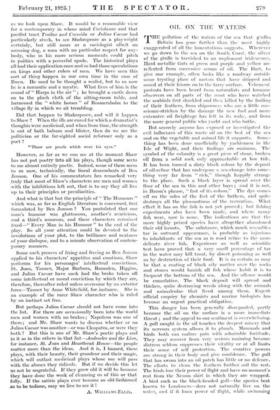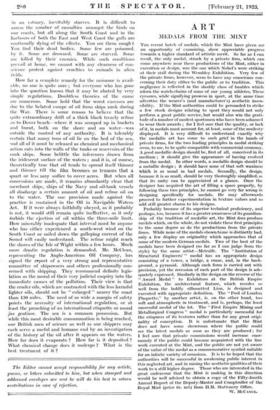OIL ON THE WATERS
T"pollution of the waters of the sea that girdlesBritain has gone further than the most highly exaggerated of all the lamentations suggests. Wherever we go down to the sea on the South Coast, the silver of the girdle is tarnished to an unpleasant iridescence. Hard metallic tints of green and purple and yellow are reflected from successive scums of oil. The Dart, to give one example, often looks like a roadway outside some trysting place of motors that have dripped and oozed at their leisure on to the tarry surface. Vehement protests have been heard from naturalists and humane observers on all parts of the coast who have watched the seabirds first shackled and then killed by the fouling of their feathers, from shipowners who are a little con- science-stricken by the damage the new fuel and more extensive oil freightage has left in its wake, and from the more general public who yacht and who bathe.
But scarcely anyone has exposed or investigated the evil influences of this waste oil on the bed of the sea and on the vegetable and animal life it supports. Some- thing has been done unofficially by yachtsmen in the Isle of Wight, and their findings are ominous. The symbol of the calamity is a great piece of stone, broken off from a solid rock only approachable at low tide. It has been turned a dirty black colour by the deposit of oil-refuse that has undergone a sea-change into some- thing very far from " rich," though happily strange to the place. Such a black layer is spread over the floor of the sea in this and other bays ; and it is not, in Bacon's phrase, " fast of its colour." The dye comes off on the soles of the feet of the bathers, and quite destroys all the pleasantness of the recreation. What effect it has on the fish is not yet proved ; but fishing experiments also have been made, and where many fish were, now is none. The indications are that the more highly prized species have altogether abandoned their old haunts. The substance, which much resembles tar in outward appearance, is probably as injurious to inhabitants of the sea as is road refuse to the more delicate river fish. Experience as well as scientific test have proved that a very small percentage of tar in the water may kill trout, by direct poisoning as well as by destruction of their food. It is as certain as may be that a coating of black oily matter over the rocks and stones would banish all fish whose habit it is to frequent the bottom of the sea. And the offence would be cumulative. The black deposit will spread and thicken, quite destroying weeds along with the animals and animalculae that lived among them. Expert official enquiry by chemists and marine biologists has become an urgent practical obligation.
This danger has been generally disregarded, partly because the oil on the surface is a more immediate threat ; and the appeal to our sentiment is overwhelming. A gull caught in the oil touches the deepest misery that its nervous system allows it to plumb. Mammals and birds both can endure pain with admirable fortitude. They may recover from very serious maiming because distress seldom suppresses their vitality or at all limits their sense of self protection. The curative powers are strong in their body and give confidence. The gull that has swum into an oil patch has little or no defence. The efforts to clean the feathers further soil the rest. The birds lose their power of flight and have no moment's rest from the Nessus shirt in which they are wrapped. A bird such as the black-headed gull—the species best known to Londoners—does not naturally live on the water, and if it loses power of flight, while swimming in an estuary, inevitably starves. It is difficult to assess the number of casualties amongst the birds on our coasts, but all along the South Coast and in the harbours of both the East and West Coast the gulls are continually dying of the effects. You see them caugh t You find their dead bodies. Some few are poisoned.
by it. Some arc drowned. Sonic are starved. Some arc killed by their enemies. While such conditions prevail at home, we cannot with any clearness of con- science- protest against cruelties to animals in alien lields.
How far a complete remedy for the nuisance is avail- r.ble, no one is quite sure ; but everyone who has gone into the question knows that it may be abated by very simple regulations. Doubtless theories of the cause are numerous. Some hold that the worst excesses are due to the belated escape of oil from ships sunk during the War. There is some reason to believe that the quite extraordinary drift of a thick black treacly refuse an to Dover beach—where it was scooped up in buckets and burnt, both on the shore and on water—was outside the control of any authority. It is tolerably certain that many tons of oil lie on the bed of the sea, and all of it must be released as chemical and mechanical action cats into the walls of the tanks or reservoirs of the sunk ships. Some belittle the inferences drawn from the iridescent surface of the waters ; and it is, of course, theoretically true that oil tends to spread itself thinner and thinner till the film becomes so tenuous that a quart or less may suffice to cover acres. But when all concessions arc made, it remains abundantly clear that merchant ships, ships of the Navy and oil-tank vessels all disoharge a certain amount of oil and refuse oil on to the water. The one provision made against the practice is contained in the Oil in Navigable Waters Act. If it were always faithfully obeyed, as it probably is not, it would still remain quite ineffective, as it only forbids the ejection of oil within the three-mile limit. How miserably inadequate that interval must be anyone who has either experienced a south-west wind on the South Coast or sailed down the galloping current of the Sound will easily understand. The refuse might reach the shores of the Isle of Wight within a few hours. Much more drastic regulation is demanded. Mr. McClean, .representing the Anglo-American Oil Company, has signed the report of a very strong and representative committee of shipowners and others professionally con- cerned with shipping. They recommend definite legis- lation as the moral of their very judicial enquiry into the immediate causes of the pollution. Their view is that the cruder oils, which are contrasted with the less harmful lighter oils, should not be " enlarged " nearer the coast than 150 miles. The need of so wide a margin of safety points the necessity of international regulation, or at least the preaching of an international etiquette or moral jus gentium. The sea is a common possession. But while this most desirable consummation is being reached, our British men of science as well as our shippers may each serve a useful and humane end by an investigation of the history of the oil after it appears on the waters. How far does it evaporate ? How far is it deposited ? What chemical change does it undergo ? What is the best treatment of it ?











































 Previous page
Previous page